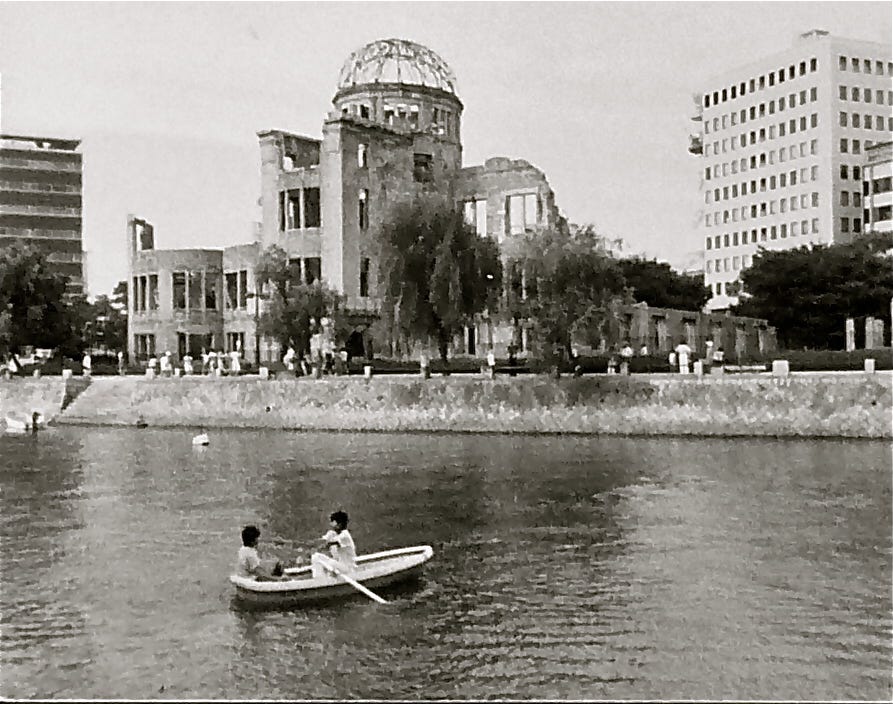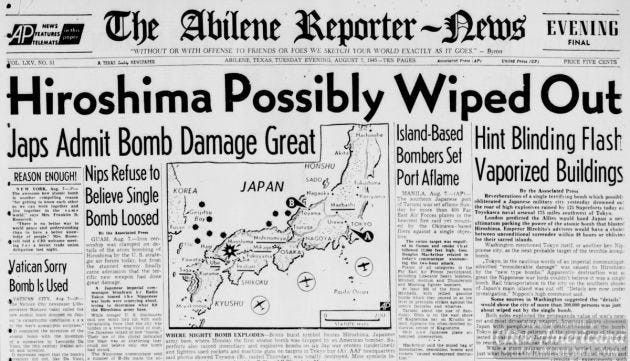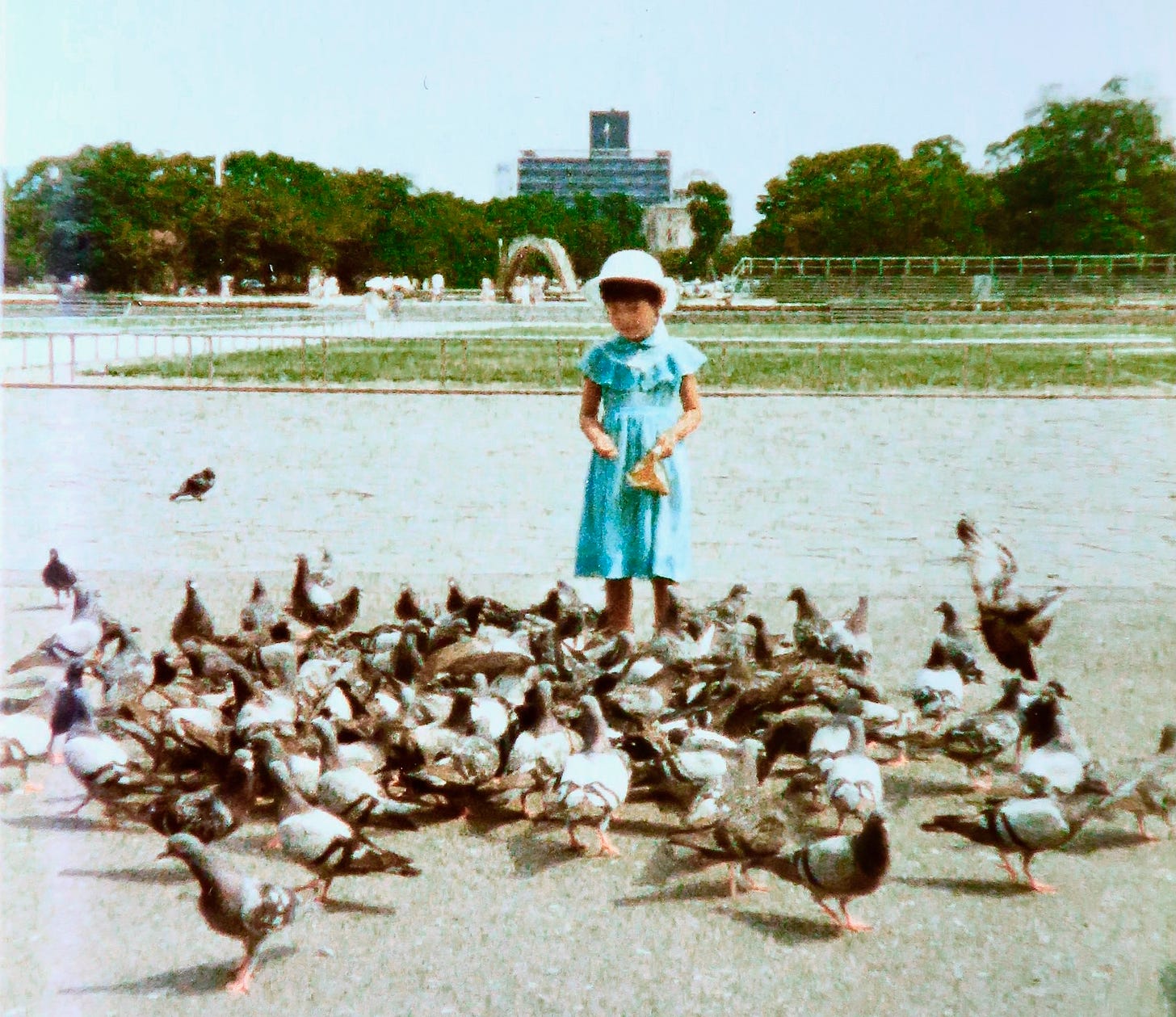Bangladesh’s Sheikh Hasina to ‘seek asylum in UK’ despite calls for probe into her protest crackdown
British foreign secretary David Lammy calls for UN-led investigation into deadly protests and loss of lives in Bangladesh
Shweta Sharma
Aug 5, 2024
Bangladeh’s former prime minister Sheikh Hasina is reportedly awaiting confirmation from the UK on her request for political asylum after being forced to flee the country on a military helicopter due to widespread violence.
Ms Hasina, 76, arrived in neighbouring India on Monday, moments before angry protesters stormed into her residence demanding her resignation after more than two decades in the country’s politics.
Anger mounted against the Hasina government after protests against a quota system in government jobs met with harsh repression by government forces, killing more than 400 people.
After landing in India’s northeastern city of Agartala, Ms Hasina arrived in New Delhi with her sister and requested asylum from the British government, according to CNN-News18.
However, Ms Hasina has been forced to extend her stay in New Delhi as she has received no confirmation from the UK, sources told the broadcaster.
Indian foreign minister Subrahmanyam Jaishankar told parliament on Tuesday that Ms Hasina requested approval to arrive in India at very short notice and her request for was approved “for the moment”.
“We simultaneously received a request for flight clearance from the Bangladesh authorities. She arrived yesterday evening in Delhi,” he said.
He said the Indian government has been in regular touch with the Dhaka authorities for the last 24 hours.
“I seek the understanding and support of the House in regard to sensitive issues regarding an important neighbour on which there has always been a strong national consensus,” he said.
Ms Hasina is accompanied by her younger sister Sheikh Rehana, who holds British citizenship. Ms Rehana’s daughter Tulip Siddiq is a member of the British parliament for the Labor Party.
The embattled leader’s request from the UK is in limbo as British foreign secretary David Lammy has called for a UN-led investigation into the deadly protests and “tragic” loss of lives in Bangladesh.
Mr Lammy said in a statement the UK and Bangladesh have “deep people-to-people links and shared Commonwealth values”.
“All sides now need to work together to end the violence, restore calm, de-escalate the situation and prevent any further loss of life.
“The people of Bangladesh deserve a full and independent UN-led investigation into the events of the past few weeks.”
He described violence in Bangladesh as “unprecedented” as he set out the UK’s ambition for Bangladesh to reach a “peaceful and democratic future”.
The UK and the Indian government have given no official statements on the developments.
The protest over the quota system, which reserved a third of civil service jobs for descendants of veterans of the country’s 1971 independence war with Pakistan, was the sternest challenge to her 15 years in power.
The protests that began in late June turned deadly after her government issued nationwide shoot-on-sight policy, imposed frequent communication blackouts and curfews across the country as students hit the streets.
Most of the quota was scaled back after the Supreme Court ruling last month in favour of students but protests continued as people demanded accountability for the deaths of those killed.
On Monday, 135 more people were killed across Bangladesh in incidents of police firing, clashes and arson as hundreds of thousands participated in the march called to Dhaka by protest leaders, reported the Dhaka Tribune.
Widespread incidents of looting, vandalism and arson were reported in parts of the country along with reports of escalated attacks on Hindu minorities.
The US government commended Bangladesh’s Army for its "restraint" and called for an interim government that is democratic.
"The United States has long called for respecting democratic rights in Bangladesh, and we urge that the interim government formation be democratic and inclusive. We commend the Army for the restraint they have showed today," a White House spokesperson said on Monday.
The EU also urged an "orderly and peaceful transition" towards a new democratically elected government in the country.
Ms Hasina’s son Sajeeb Wazed Joy and her allies have said she would not return to politics.
"She’s in her late 70s. She is so disappointed that after all her hard work, for a minority to rise up against her, I think she’s done,” her son told BBC.
Ms Hasina is known as the “iron lady” of Bangladesh who has spent a total of 20 years in office after first coming to power in 1996.
This is the second time she has been forced into exile in her life. She first went into exile after her father, Sheikh Mujibur Rahman, the freedom fighter who founded Bangladesh, was assassinated along with her mother and three brothers in 1975.
Bangladesh transition: After 15 years entrenched in power, Sheikh Hasina fades away
2024.08.06
Dhaka, Washington and Bangkok
 Bangladeshi Prime Minister Sheikh Hasina greets journalists in Dhaka after official election results gave her a third straight term, Dec. 31, 2018.
Bangladeshi Prime Minister Sheikh Hasina greets journalists in Dhaka after official election results gave her a third straight term, Dec. 31, 2018.When protesters ransacked Sheikh Hasina’s official residence and set fire to a museum honoring her assassinated father – Bangladesh’s founding leader – they symbolically bid good riddance to the rule of its longest-serving prime minister, whose rise to power was inextricably tied to him.
Hasina, 76, one of two women to have served as Bangladesh’s prime minister, resigned and fled the country on Monday. In a stunning turn of events, the army chief announced that she had stepped down, as student-led protesters converged on the capital Dhaka again to demand her government’s ouster after 15 years of consecutive rule, which saw it drift toward authoritarianism.
Hasina, whose supporters had dubbed her “the mother of humanity,” quit office amid a shaky economy and only seven months after her government was elected to a fourth consecutive term in power and fifth overall.
However, there were widespread allegations that the polls were skewed in favor of her ruling Awami League party. The main opposition Bangladesh Nationalist Party (BNP), led by her bitter enemy Khaleda Zia, had boycotted the Jan. 7 general election after Hasina refused to make way for a caretaker government to oversee the electoral process.
Since taking office in 2009, Hasina had led the South Asian nation of 170 million people on a track of mostly robust economic growth. But in recent years, she drew international scrutiny for an increasingly iron-fisted style and a record overshadowed by allegations of enforced disappearances and arrests of journalists and critics.
“If I’ve made any mistakes along the way, my request to you will be to look at the matter with the eyes of forgiveness,” Hasina told the nation in a televised address back in January as she sought re-election. “If I can form the government again, I will get a chance to correct the mistakes.”

Hasina’s life as a politician was born in the wake of bullets fired by assassins.
She formally took over the Awami League six years after her father, Sheikh Mujibur Rahman, her mother and other family members were gunned down during a coup in 1975.
By a stroke of luck, she escaped being killed alongside them. She and her sister were traveling abroad during the assassination of Rahman, who had led the Bangladeshi independence movement in the 1971 war against Pakistan.
“I stepped into politics to fulfill my father’s dream,” Hasina told the nation during her electoral speech in January.
Hasina saw it as her mission to carry on with the legacy of her late father, who was widely revered as a national hero in Bangladesh’s struggle for independence. In 2021-22, her government spent many millions of U.S. dollars to commemorate his memory and mark the 50th year of nationhood.

As the milestone anniversary approached, it became increasingly dangerous to speak freely about Bangladesh’s founding father, because his daughter’s government had instituted strict laws against defaming him in an effort to control the historical narrative, analysts said.
But Rahman, who was also known as Sheikh Mujib, slid into his own brand of autocratic rule after becoming the leader of the young nation. A year before he was assassinated, Rahman banned all political parties and the majority of the press, and formed a Chinese Communist Party-style one-party system called Bakshal.
The widespread anti-Hasina protests that began last month and culminated in her ouster on Aug. 5 stemmed from anger vented by students over quotas for government jobs that heavily favored children and grandchildren of veterans who had fought on Mujibur’s side in the 1971 war against Pakistan.
The deadly protests persisted although the nation’s supreme court moved to slash the quotas and make applications for most government jobs merit-based in the country where there is a high jobless rate among young people.
Start of political career
In 1981, Hasina returned to Bangladesh from exile in India shortly after being elected president of the Awami League. At the time, the country was ruled by President Ziaur Rahman, a military general who a few years earlier had founded the BNP.
Ziaur Rahman was killed in a coup days after Hasina returned, allowing another army general, Hussain Muhammad Ershad, to grab power.
Hasina collaborated with the BNP’s Khaleda Zia – Ziaur Rahman’s widow – to oust Ershad in a civilian mass movement.
In 1996, when the BNP held an election defying Hasina’s demand that a neutral caretaker government oversee the polls, she led opposition parties to boycott the election.
The BNP returned to power virtually unopposed – similar to her latest victory on Jan. 7 – but the Awami League’s constant street agitations forced Zia’s government to resign and call for fresh elections under a newly constituted caretaker system.
In that election, Hasina became prime minister for the first time.
Her party became known for aggressive and relentless political tactics, even when it was relegated to the opposition again in 2001. Frequent nationwide strikes and road blockades called by the Awami League kept the BNP government on the back foot.
RELATED STORIES
Sheikh Hasina: A Portrait of Power
50 Years After Independence, History is a Risky Subject in Bangladesh
Sheikh Hasina’s unyielding reign
Bangladesh’s Hasina tightens grip as ‘dream of multiparty democracy shattered
Hasina’s political life was also marked by direct threats of violence against her.
According to the Awami League’s tally, she survived as many as 19 assassination attempts, the most recent of which occurred in 2004. In that incident, she narrowly escaped a grenade attack that killed more than a dozen people.
When elections approached in 2006, Hasina’s party again boycotted the polls, claiming that the BNP manipulated the caretaker system. Bloody street battles that ensued enabled the military to intervene in 2007, and she took a victory parade. But the new military-backed government placed both Hasina and Zia in jail on corruption charges.
Both were released a year later to contest the election in 2008, which Hasina won in a landslide.

In more recent years, Hasina was widely credited for tackling the problem of Muslim extremism in Bangladesh, especially after groups such as the Islamic State and al-Qaeda carried out killings of secular writers and bloggers in the country. However, the country’s deadliest-ever terrorist attack, an overnight siege of a café by pro-IS militants that left at least 20 dead, occurred under her watch.
Meanwhile, allegations about security forces carrying out extrajudicial killings kept surfacing. An ostensive anti-drug drive in 2018, an election year, left more than 400 people dead, according to local and international human rights groups.
It was in 2018 that the government relaunched an internet law and made it harsher. The Digital Security Act would go on to target journalists and social media speech disproportionately, stifle a climate for unfettered expression and lead to arrests of critics of her government.
Muslim scholars urge Bangladesh Army to hold transparent elections after premier flees country
Bangladesh’s military chief announces transitional government following resignation of Prime Minister Sheikh Hasina
Anadolu staff |06.08.2024 -
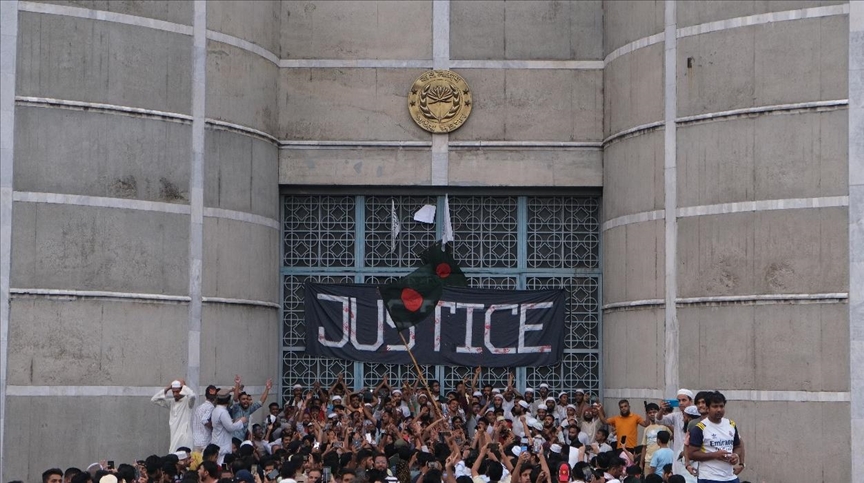
ANKARA
A group of Muslim scholars urged the Bangladesh Army on Monday to protect the country and hold transparent elections.
The International Union of Muslim Scholars (IUMS) issued the statement after Bangladeshi Prime Minister Sheikh Hasina resigned and fled to India amid violent student protests over government job quotas.
IUMS expressed solidarity with the Bangladeshi people, urging the army to transfer power to an interim civilian government until transparent elections are held.
The statement also called on the people to preserve order and prevent any attacks on the state and private property.
According to media reports, protesters set fire to government buildings and the headquarters of the ruling Awami League party in the capital, Dhaka.
Early on Monday, Bangladesh military chief Gen. Waker-uz-Zaman announced a transitional government after Hasina fled the country.
Bangladesh has witnessed large-scale protests since early July that began as university student-led demonstrations against controversial civil service job quotas. Local media reported around 400 deaths during the protests.
*Writing by Ahmed Asmar
Canada calls for peaceful return to democratic, inclusive govt in Bangladesh
ByAnirudh Bhattacharyya
Aug 06, 2024
Prime Minister Sheikh Hasina resigned and left the country after weeks of quota protests turned violent leaving hundreds dead
Toronto: The Canadian government has called for a “quick and peaceful return to a democratic and inclusive civilian-led government in Bangladesh” in a statement on Monday evening following the departure of Sheikh Hasina, the Prime Minister, fleeing Dhaka and an interim dispensation assuming charge.
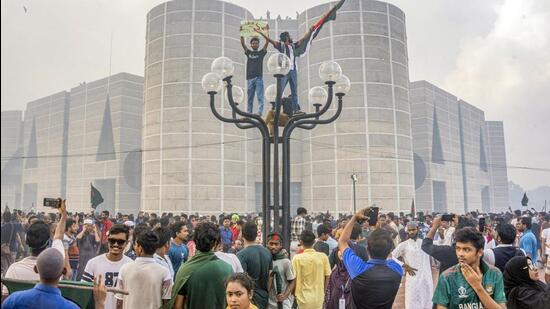
In a statement released by Global Affairs Canada, the country’s foreign ministry, Minister of Foreign Affairs Melanie Joly said, “As a country committed to democracy, inclusive governance and the rule of law, Canada calls for a quick and peaceful return to a democratic and inclusive civilian-led government in Bangladesh. We urge the people of Bangladesh to unite around the principles of freedom and democracy upon which their country was founded.”
“Respect for fundamental human rights, including freedom of expression and the right to peaceful assembly, are critical for democratic governance and to build peaceful and prosperous societies,” Joly added.
Ottawa also urged all parties to “respect and uphold democratic institutions and processes and the rule of law” and “a full and impartial investigation” into the crimes committed during the tumultuous phase.
“Canada strongly condemns the human rights violations, deaths, torture, arbitrary arrests and lethal force used against the people of Bangladesh in recent weeks. We reiterate our deep condolences to all those impacted,” Joly said, while calling for maintenance of full Internet access in the country.
Meanwhile, Canadian MP Shuvaloy Majumdar, who is of Bengali heritage, posted on X that he shared “the anxiety so many Canadian Bengalis are now experiencing, and call for calm and stability in Bangladesh”.
“Bangladesh today descends into the anarchy and atrocities deeply reminiscent of my own family’s experience more than fifty years ago. Religious minorities - Bengali Hindus and Christians - are once again subjected to mobs burning people, homes, businesses, mandirs, and places of worship. Violent mobs are also attacking Muslims, who today as they did a half century ago, show great courage in the protection of their neighbours,” he said in the post.
Referring to the period right before Bangladesh was liberated from Pakistan, he said, “The evil that once descended upon my family - murdering millions and displacing tens of millions - must not be permitted to rise again.”
By AFP

Bangladesh's ousted prime minster Sheikh Hasina fled the country by helicopter on Monday, ending 15 years of autocratic rule - Copyright AFP Munir UZ ZAMAN
Families of political prisoners secretly jailed in Bangladesh under the autocratic rule of ousted premier Sheikh Hasina waited desperately Tuesday for news of their relatives, as some of those missing were released.
“We need answers,” said Sanjida Islam Tulee, a coordinator of Mayer Daak, meaning “The Call of the Mothers”, a group campaigning for the release of people detained by Hasina’s security forces.
Rights groups accused Hasina’s security forces of abducting and disappearing some 600 people — including many from the main opposition Bangladesh Nationalist Party and the banned Jamaat-e-Islami, the country’s largest Islamist party.
Tulee told AFP that at least 20 families gathered outside a military intelligence force building in a northern Dhaka neighbourhood, waiting for news of their relatives.
Army chief General Waker-Uz-Zaman announced Monday that Hasina had resigned after weeks of deadly protests, and the military would form a caretaker government.
Hours later President Mohammed Shahabuddin — after a meeting with the army chief — said it had been decided to free all those arrested during the student protests, as well as key opposition leader Khaleda Zia.
Ex-prime minister Zia, 78, chairperson of the Bangladesh Nationalist Party (BNP) is in poor health and was largely under house arrest after being sentenced to 17 years in prison for graft in 2018.
– ‘What happened to others?’ –
Among the most high profile of those released on Tuesday was opposition activist and lawyer Ahmad Bin Quasem, son of Mir Quasem Ali, the executed leader of Jamaat-e-Islami.
“He was released from secret detention this morning,” family friend and relative Masum Khalili told AFP. “He had a medical check-up, his condition is stable.”
Quasem, a British-educated barrister, was abducted — allegedly by security forces in plainclothes — in August 2016.
Security forces during Hasina’s rule were accused of detaining tens of thousands of opposition activists, killing hundreds in extrajudicial encounters, and disappearing their leaders and supporters.
Human Rights Watch last year said security forces had committed “over 600 enforced disappearances” since Hasina came to power in 2009, and nearly 100 remain unaccounted for.
Hasina’s government denied the allegations of disappearances and extrajudicial killings, saying some of those reported missing drowned in the Mediterranean while trying to reach Europe.
“We heard Ahmad Bin Quasem has been released,” Tulee said, “but what happened to others?”
Bangladesh protesters call for new govt under Nobel laureate Muhammad Yunus
Yunus is a social entrepreneur, banker, economist and civil society leader who was awarded Nobel Peace Prize in 2006 for founding Grameen Bank and pioneering concepts of microcredit and microfinance in the South Asian nation.

AFP
Yunus says Hasina ouster by student-led protests "is like a second liberation for the people of Bangladesh." / Photo: AFP Archive
Bangladesh student protest coordinators have called for the formation of a new interim government with Nobel Peace laureate Muhammad Yunus as its chief adviser, according to a video released by the coordinators on Facebook.
Student leaders, who spearheaded a movement against job quotas that turned into a call for Sheikh Hasina to resign, said early on Tuesday that they want a new interim government with Nobel Peace laureate Muhammad Yunus as its chief adviser.
"Any government other than the one we recommended would not be accepted," Nahid Islam, one of the organisers of the student movement, said in a video on Facebook with three other organisers.
"We wouldn't accept any army-supported or army-led government."
"We have also had discussions with Muhammad Yunus and he has agreed to take on this responsibility at our invitation," Islam added.
Yunus is a Bangladeshi social entrepreneur, banker, economist and civil society leader who was awarded the Nobel Peace Prize in 2006 for founding the Grameen Bank and pioneering the concepts of microcredit and microfinance.
Yunus told Indian media on Monday that Hasina's ouster by student-led protests "is like a second liberation for the people of Bangladesh."
"We were an occupied country as long as she (Hasina) was there. She was behaving like an occupation force, a dictator, a general, controlling everything. Today all the people of Bangladesh feel liberated."
The demand comes after PM Hasina resigned and fled the country to India, ending her 15-year rule amid deadly protests.
Bangladesh's Army Chief General Waker-Uz-Zaman said in a broadcast to the nation on state television that Hasina had resigned and the military would form a caretaker government.
"The country has suffered a lot, the economy has been hit, many people have been killed — it is time to stop the violence," said Waker, shortly after jubilant crowds stormed and looted Hasina's official residence.
Zaman plans to meet the protest coordinators at 12 pm local time (0600 GMT) on Tuesday, the army separately said in a statement.

Weeks of unrest
Zaman said he had held talks with leaders of major political parties — excluding Hasina's long-ruling Awami League — to discuss the way ahead and was due to hold talks with the President Mohammed Shahabuddin .
An interim government will hold elections as soon as possible after consulting all parties and stakeholders, President Shahabuddin said in a televised address late on Monday.
The weeks of protests had begun peacefully as frustrated students demanded an end to a quota system for government jobs, but they turned into an unprecedented uprising against Hasina and her ruling Awami League party.
Anger also lingered from January's election, which saw the jailing of thousands of opposition members.
The government responded to the protests with force, leaving nearly 300 people dead and fuelling further outrage.
Bangladesh has a long history of coups.
The military declared an emergency in January 2007 after widespread political unrest and installed a military-backed caretaker government for two years.
Hasina then ruled Bangladesh from 2009 and won her fourth consecutive election in January after a vote without genuine opposition.
Rights groups accused her government of misusing state institutions to entrench its hold on power and stamp out dissent, including through the extrajudicial killing of opposition activists.
SOURCE: TRTWorld and agencies
Bangladesh: Students want interim govt
Islam, Asif Mahmud and Abu Bakr Mazumdar
Tuesday. They also released a video statement
Arnab Ganguly Calcutta Published 06.08.24
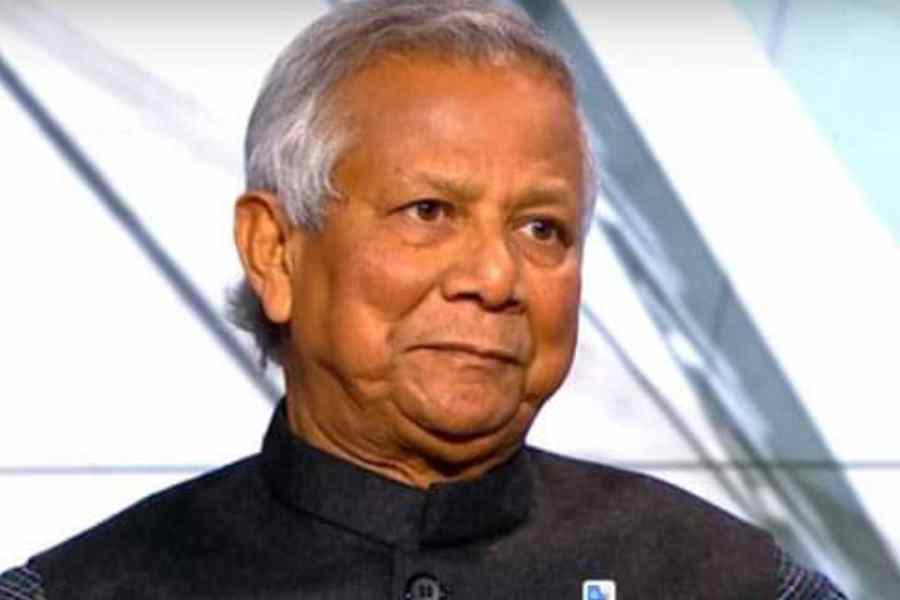
Dr Muhammad Yunus.X/@czverse
Nobel laureate Dr Muhammad Yunus will be the chief adviser to the interim government in Bangladesh.
This was announced by Students against Discrimination coordinators Mo. Nahid Islam, Asif Mahmud and Abu Bakr Mazumdar at 4.40 am (Bangladesh time) on Tuesday. They also released a video statement.
“We had taken 24 hours to propose our interim government. Given the emergency situation, we are now announcing its outline. We have decided to form an interim government with Nobel laureate Dr. Muhammad Yunus as the chief adviser, who is universally accepted and internationally renowned,” read the statement. “We have already spoken with Dr Yunus, and he has agreed to take on this crucial responsibility at the call of the student community to save Bangladesh.”
The students have urged Bangladesh President Mohammad Shahabuddin to announce the government.
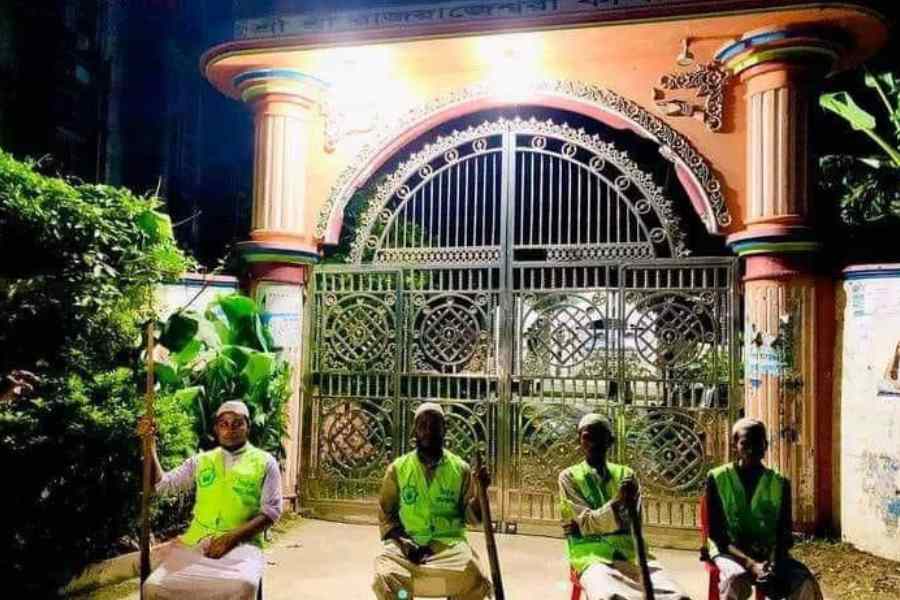
Youths guarding a temple at Comilla.Sourced by the correspondent
“We appeal to the President to quickly form the interim government with Dr Muhammad Yunus as the chief advisor. We will announce the names of the other members of this interim government by this morning,” read the statement. “We want to see the formation process of this government by this morning.”
Former Prime Minister Sheikh Hasina faced with an unprecedented countrywide students movement that left over 300 dead in three weeks resigned and fled from Bangladesh on Monday afternoon, with the Army taking over the reins of the government with the promise of an interim government.
President Shahabuddin had late on Monday dissolved the Parliament and ordered the release of the former prime minister and BNP chief Khaleda Zia, who was under house arrest.
"A decision has been taken to form an interim government as soon as possible by dissolving parliament. The army will also take measures to normalise the prevailing anarchic situation," said the president, in a televised address, with the chiefs of the three services standing behind him.
Since the departure of Sheikh Hasina – who is at the Hindon air base near Delhi – Bangladesh has seen massive violence targeting those close to the Awami League and also against minorities.
Actor Shanto Khan and his father Salim Khan, chairman of the Lakshmipur Union board were killed on Monday night. Violence has been reported from several parts of Dhaka, Jessore, Chandpur, Kushthia, Baniachang, Sibalaya, Sripur, Chuadanga, Jhinaidaa, Ghazipur, Shariyatpur and Koyra.
"I am directing the armed forces to take stern measures to protect the lives and properties of the people and state assets. I call upon all to come forward to ensure communal harmony, security of minorities and protect government property," the president said.
He said those involved in killing and violence will be brought to justice through impartial investigation.
All offices and courts in the country will open from Tuesday, he added.
"Let's work together to save the country. I humbly call upon all to play their role from their respective positions to advance the country rising above mutual envy and animosity," he added.
Students claimed there was an attempt to sabotage the uprising.
“We can see that after our uprising and revolution, the fascists and their accomplices are causing chaos and sabotage. In various places, shootings are taking place, temples are being attacked, and there is sabotage and looting. We believe that these incidents are being orchestrated to undermine our students' and citizens' revolution. We urge the Dear students-citizen striving for freedom to remain vigilant and cautious,” the statement said.
After Hasina’s departure, people had raided her official residence Gana Bhaban and took away her personal belongings that included printer cartridges. Refrigerators, television sets, furniture, lamps and even a car were damaged.
Muhammad Yunus: 5 facts about possible
ByHT News Desk
Aug 06, 2024
Muhammad Yunus won the Nobel Peace Prize for his efforts in micro-finance in 2006 and revolutionised the field of micro-lending through his Grameen Bank.
Former Bangladesh prime minister Sheikh Hasina's resignation and her escape into India on Monday following the government job quota protests by the students community in the country is the beginning to a new chapter of the country's turbulent political history since its formation in 1971 following a brutal Liberation War.
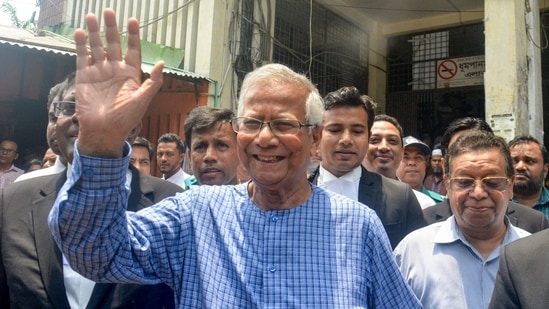
With still over 100 charges in his name, Yunus was sentenced to six months in jail by the court in January but was granted bail in March..(AFP)
LIVE COVERAGE OF EVENTS IN BANGLADESH
Mohammed Shahabuddin, Bangladesh President, announced an interim government to be formed soon after the parliament is dissolved and has also ordered the release of former prime minister Khaleda Zia.
ALSO READ | Bangladesh's turbulent political history: 5 facts
Amidst this political turmoil, the student protesters have proposed Nobel Peace laureate Muhammad Yunus to be the chief adviser for the suggested interim government, in a Facebook video which was posted on Tuesday early morning.
“We have decided that internationally renowned Nobel laureate Dr Muhammad Yunus will be appointed as the chief advisor in the interim government, and we have also spoken with Dr Muhammad Yunus. He has agreed to take on this significant responsibility in response to the call of the students and public to safeguard Bangladesh,” said Nahid Islam, a key coordinator of the Anti-Discrimination Student Movement which spearheaded the protests.
Who is Muhammad Yunus?
Here are five facts about him.
Muhammad Yunus was born on 28 June 1940 in Chittagong, Bangladesh, in a well-off family with his father being a successful goldsmith. He finished his UG and PG at the Dhaka University in Bangladesh and then received a Fulbright scholarship to study economics at Vanderbilt University where received his Ph.D in 1969. In the following year, he became an assistant professor at Middle Tennessee State University before returning to Bangladesh, where he headed the economics department of Chittagong University.
(ALSO READ | ‘…like a dictator’: Bangladesh Nobel laureate Muhammad Yunus reacts to Sheikh Hasina's resignation)
In 1983, Muhammad Yunus established the Grameen Bank which was founded on the belief that “credit is a fundamental human right". Its objective was to help poor people escape poverty by providing loans to them on terms suitable to them and by teaching them a few sound financial principles so they could help themselves. What started out as small amounts of money as personal loans to basketweavers in his home country, developed into a world movement revolutionising finances through micro-lending.
Muhammad Yunus won the Nobel Peace Prize for his efforts in micro-finance in 2006 and has also won numerous other accolades such as the US Presidential Medal of Freedom, Congressional Gold Medal, Mohamed Shabdeen Award for Science (1993), Sri Lanka; Humanitarian Award (1993), CARE, USA; World Food Prize (1994), World Food Prize Foundation, USA; lndependence Day Award (1987), Bangladesh’s highest award; King Hussein Humanitarian Leadership Award (2000), King Hussien Foundation and so on. He also served as a board member of the United Nations Foundation from 1998 to 2021.
In 2007,
Muhammad Yunus announced plans to set up his own "Citizen Power" party in attempt change the political culture of Bangladesh but was plagued with troubles due to instability and periods of military rule.
This ‘banker to the poor’ also had his share of legal troubles from the regime, since Hasina returned to power in 2008. He was slapped with a series of criminal cases and accused of promoting homosexuality in a smear campaign led by the state. Bangladesh government forced him out Grameen Bank in 2011 and in 2022 he was hit with embezzlement charges. With still over 100 charges in his name, Yunus was sentenced to six months in jail by the court in January but was granted bail in March.
Key Role Likely For Muhammad Yunus In
All About The Nobel Laureate
Amid the unrest and uncertainty, student leaders have called on the Army and President to include Dr. Muhammad Yunus in a leading role.
Outlook Web Desk
Updated on: 6 August 2024

Nobel Laureate Muhammed Yunus Likely To Be Chief Adivsor | Photo: AP
Following the abrupt resignation of Prime Minister Sheikh Hasina, the Bangladesh army is working with the President and the opposition parties to form an interim government as soon as possible.
The interim government is expected to be announced soon which will also give insight as to who will take over as the prime minister of the nation. Amid the unrest and uncertainty, student leaders have called on the Army and President to include Dr. Muhammad Yunus in a leading role.
Track the latest and LIVE Updates on Bangladesh Protests on Outlook India
The coordinators of the Anti-Discrimination Student Movement in Bangladesh took to social media to announce that the Nobel Laureate will take on the role of the Chief Advisor.
While this development is yet to be confirmed by the President, student leaders added that Yunus has agreed to take on the responsibility and be part of the interim government.
"We have decided that the interim government would be formed in which internationally renowned Nobel Laureate Dr Mohammad Yunus, who has wide acceptability, would be the chief adviser,” student leader Nahid Islam was quoted as saying by the Daily Star.
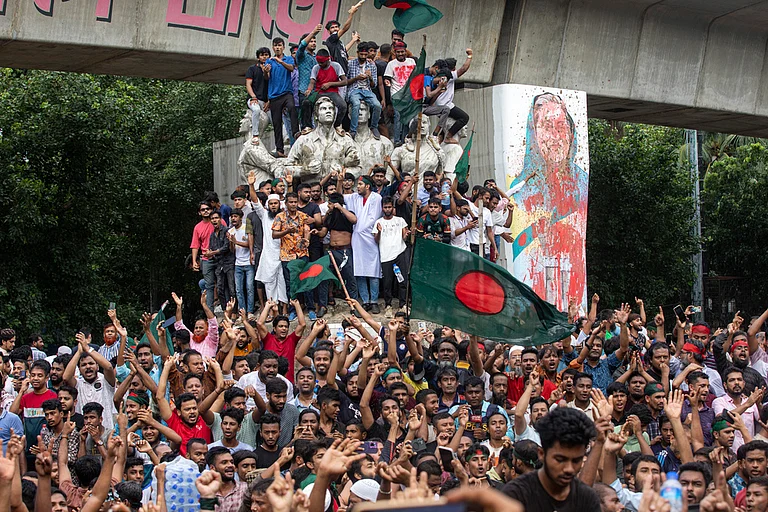
Bangladesh Protests: Parliament Dissolved; Sheikh Hasina Likely To Seek Asylum In UK | Top Points
BY Outlook Web Desk
Bangladesh swirled into chaos after Awami League Chief Sheikh Hasina resigned as the prime minister and fled the country amid deadly unrest.
Shortly after Hasina fled to India, protestors stormed into Ganabhaban - the official residence of the leader. Army Chief Waker-Uz-Zaman confirmed the resignation and urged for an end to the violence.
The Army Chief added that an interim government will be formed to oversee the diplomatic, social and economic relations of the state.
Who Is Dr Muhammad Yunus?
Dr Muhammad Yunus is a social entrepreneur, banker, economist and civil society leader. In 2006, Yunus rose to international prominence after he and Grameen Bank received the Nobel Peace Prize for their work in microcredit and microfinance.
Under Grameen Bank, small loans to underserved entrepreneurs were given and they were empowered to achieve economic and social development despite limited access to traditional banking services.
Apart from the Nobel, Yunus has been a recipient of various international awards such as the United States Presidential Medal of Freedom in 2009 and the Congressional Gold Medal in 2010

Nahid Islam (centre) spearheaded a movement against job quotas that turned into a call for Prime Minister Sheikh Hasina to resign. — Reuters pic
Tuesday, 06 Aug 2024
DHAKA, Aug 6 — Often seen in public with a Bangladeshi flag tied across his forehead, Nahid Islam is a soft-spoken sociology student who spearheaded the protest that ousted Prime Minister Sheikh Hasina after 15 straight years in power
Islam, 26, was the coordinator of a student movement against quotas in government jobs that morphed into an oust-Hasina campaign. He rose to national fame in mid-July after police detained him and some other Dhaka University students as the protests turned deadly.
Nearly 300 people, many of them college and university students, were killed in weeks of violence across the country that only abated when Hasina resigned and fled to neighbouring India on Monday.
Islam and other student leaders were due to meet army chief General Waker-Uz-Zaman at noon (0600 GMT) on Tuesday. Zaman had announced Hasina’s resignation and said an interim government would be formed.
Islam, who speaks unemotionally but firmly in public, has said the students would not accept any government led or supported by the army and has proposed that Nobel laureate Muhammad Yunus be the chief adviser.
“Any government other than the one we recommended would not be accepted,” he said in a Facebook post early on Tuesday.
On Monday, flanked by other student leaders, the bearded and stocky Islam told reporters: “We won’t betray the blood shed by the martyrs for our cause.
“We will create a new democratic Bangladesh through our promise of security of life, social justice and a new political landscape.”
He vowed to ensure the country of 170 million never returns to what he called “Fascist rule” and asked fellow students to protect its Hindu minority and their places of worship.
Islam, who was born in Dhaka in 1998, is married and has a younger brother, Nakib. His father is a teacher and his mother a homemaker.
“He has incredible stamina and always said the country needed to change,” Nakib Islam, a geography student, told Reuters. “He was picked up by the police, tortured until he was unconscious, and then dumped on the road. Despite all this, he continues to fight. We have confidence that he will not give up. Proud of him.”
Sabrina Karim, associate professor of government at Cornell University who specialises in studying political violence, called Monday a historic day for Bangladesh.
“This might very well be the first successful Gen Z-led revolution,” she said. “There is perhaps some optimism for a democratic transition even if the military is involved in the process.” — Reuters
When kingdoms fall, and rulers flee, their residences become amusement parks for commoners. Protesters stormed and ransacked Ganabhaban, the PM's residence in Dhaka, after Sheikh Hasina left Bangladesh amid protests. The siege of palaces was also seen when regimes fell in Sri Lanka, Iraq and Afghanistan.

Bangladesh became the latest in a series of countries where people stormed the leader's house. This was also seen in Sri Lanka, Iraq and Afghanistan. (Image: X/Reuters/AP)
Priyanjali Narayan
New Delhi
In ShortProtestors have entered the PM's house in Bangladesh and are sitting on the bed
This has also happened in other countries where rulers had to resign amid protests
People earlier had entered presidential palaces in Sri Lanka, Afghanistan and Iraq
When kingdoms fall, the palace gates are swung wide open. And when rulers flee, protesters enter the palaces with all their might. In Dhaka, protesters did exactly that. They entered Ganabhaban, the PM's residence, after Sheikh Hasina tendered her resignation and left the nation as a sea of protesters marched towards Ganabhaban. Bangladesh is not the only nation where commoners stormed the leader's residence as the regime fell. This was also seen when kingdoms fell in Sri Lanka, Iraq and in Afghanistan.
advertisement
On Monday, protesters stormed Hasina's residence to assert their victory.
In a video, which has gone viral on social media, a man is seen lying on a bed at the PM's house. He is reclined on the bed and is seen talking to people. He says, "Gonobhobon is under our control".
In another video, people are seen looting television sets, chairs and tables from the PM's house. Even kitchens and refrigerators were ransacked as people feasted on fish and biryani. Also, many of them ran away with raw fish, live goats and ducks, visuals showed.
The clip of a man with a massive replica of a fish on display in the Ganabhaban campus also went viral. The massive fish replica perhaps could be that of the Hilsa, the beloved and national fish of the fish-loving nation.
Others took her saree and a Dior suitcase. Hasina was fond of sarees and had a good saree collection.
One of the worst scenes was of a ransacker posing with female lingerie retrieved from Ganabhaban.
Bangladesh is one of the countries in the last five years to see such loot. This was seen in some other places too, where the ruler had been deposed. It could be the result of people's assertion and a show of symbolic capture after a period of authoritarian rule. For most, it is a free-for-all celebration after a strong leader has been deposed.
SWIMMING IN GOTABAYA RAJAPAKSA'S PALACE IN 2022
In 2022, protestors stormed open the gates of the presidential residence after President Gotabaya Rajapaksa fled Sri Lanka amid protests.
Protestors entered the palace, which had a large dinner table, a lounge filled with sofas and a private swimming pool, according to NPR. A video also showed a man on a bed at the President's palace with a Presidential flag, reported BBC.
Clips of men jumping on the Presidential bed also went viral.
Next was, protestors taking a dip in the pool. They also entered the bedroom and the office. People also rummaged through the President's personal belongings.
In Sri Lanka, one of the most shared pictures on social media is of the three boys scrolling their phones. Young boys scrolling their phones is nothing out of the ordinary, except it is at the President's residence. The room had wide windows, a wooden bed with beautiful carvings and carpets around it and the boys were seen scrolling their phones on the bed.
WHEN PROTESTERS TOOK OVER PALACES IN IRAQ AND AFGHANISTAN
In 2022, the same year people ransacked Rajapaksha's palace, protesters were seen storming the presidential palace in Baghdad, Iraq's capital, after the announcement by Iraq's influential Shia Muslim cleric Moqtada al-Sadr to quit politics.
They were also soon relaxing in the pool, reported Reuters. This took place after deadly clashes between the security forces and the angry crowd.
The unrest caused many deaths and left hundreds with injuries and was an outcome of prolonged protests for new elections and parliamentary dissolution.
In 2021, the Taliban entered Afghanistan's President's palace in Kabul. In a video, armed men were seen in the halls of the palace as they sat on the chair of President Ashraf Ghani, who had left the country, reported NBC.
They were seen taking a walk inside the palace and giving tours to Al Jazeera journalists, reported NBC.
Here, the Taliban did not storm the palace. It was a handshake with the Presidential Protection Service, which had protected it for two decades.
The government official had escorted the Taliban commander into the palace. They even took a selfie together.
However, occupying the chair and strolling around the palace aimlessly was to symbolise the capture of power.
This is how when regimes fall, the palaces become an amusement park for the common people, who are taken by the riches and the lavish lifestyle of their former rulers. Dhaka's Ganabhaban saw on Monday what was witnessed by palaces in Sri Lanka, Iraq and Afghanistan.
Photos: Thousands of Bangladeshis out on
Nation’s army chief to soon meet president, says an interim administration will be constituted.
BenarNews staff
2024.08.05

Sheikh Hasina Wazed, Bangladesh’s longest-serving prime minister, stepped down from the top post and fled the country, cutting short her fourth consecutive term in power after nearly 15 years at the helm of the South Asian nation.
Rights groups had accused the daughter of Sheikh Mujibur Rahman, the country’s first president, of ruling with an iron hand, silencing criticism and dissent, and using state machinery to do her bidding.
Hasina’s resignation came after at least 98 people had been killed nationwide on Sunday, following a civil disobedience campaign over the killings of at least 200 demonstrators during an earlier phase of protests last month.








